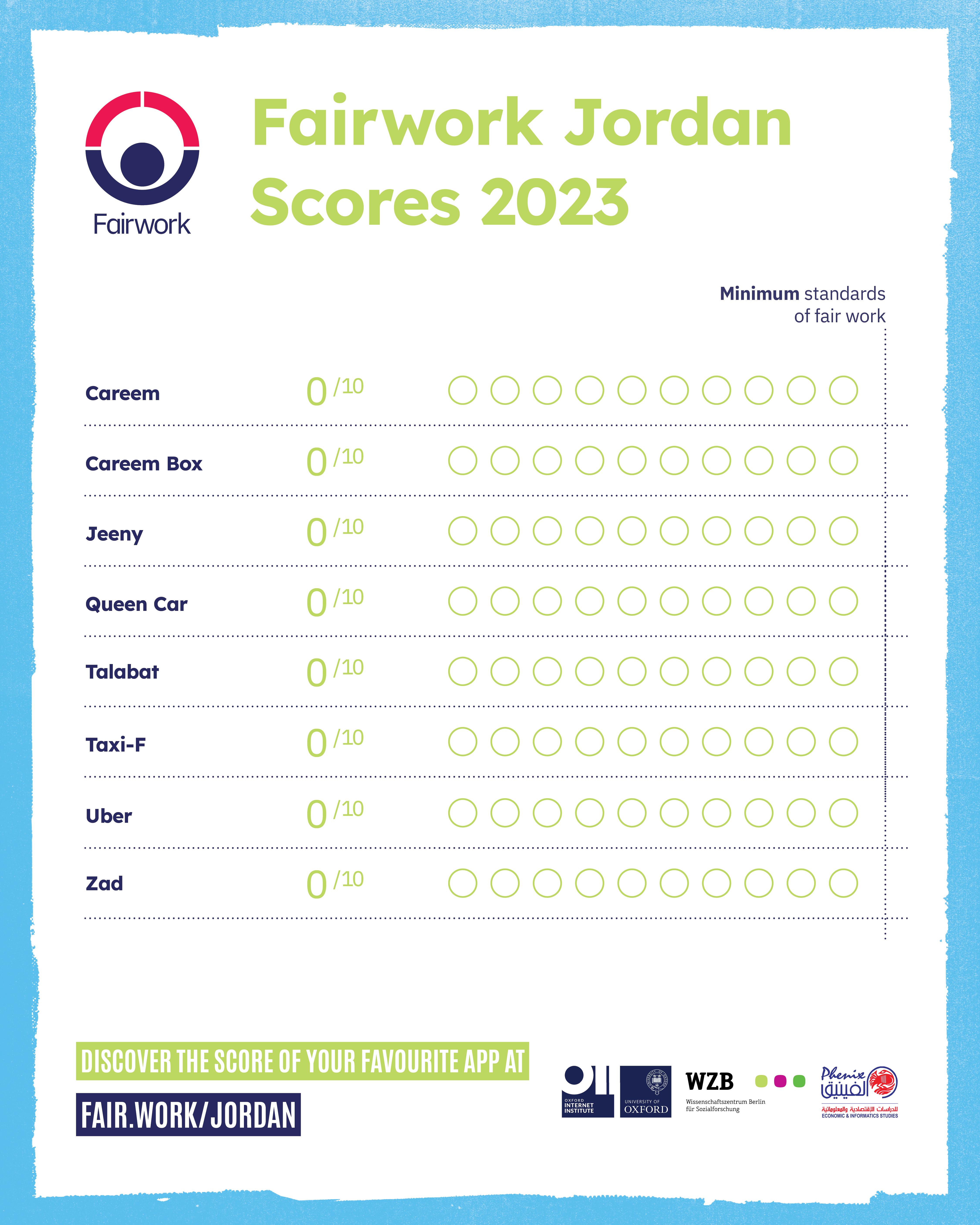New report from Phenix Center for Economic and Informatics Studies reveals poor labor practices in Jordan’s gig economy

Thousands of people in Jordan work in the gig economy, but a new report finds many of these workers face difficult working conditions. Eight of the most popular ride-hailing and delivery applications operating in Jordan have been reviewed and assigned a rating based on their working conditions. Platforms were assessed on the basis of five principles of fair work: fair pay, fair conditions, fair contracts, fair management, and fair representation. Out of a potential score of ten, none of the Jordan-based platforms scored any point. These poor ratings highlight the precarity of workers’ situation in Jordan’s platform economy, which partly results from regulatory gaps given the fast-paced growth of the digital labor market in recent years.
This is the first study of its kind in Jordan, which sheds light on the need to set up regulatory mechanisms, labor standards, and company practices that prioritize the needs of workers and protect their rights. Regulations need to ensure that international and national standards of decent work, particularly regarding wage levels, working hours, and access to social protections, consistently apply throughout the platform economy.
Ratings

Key findings
Fair Pay: Platform workers in Jordan legally operate as freelancers; thus, working hours and consequent income varied between workers. For those workers who continuously worked 48 hours/week, we found no evidence that platforms had mechanisms or policies in place that aim to guarantee those workers the legal full-time (48hrs/week) monthly minimum wage of 260 Jordanian Dinars (USD 367) per month. Workers we spoke to experienced problems receiving timely pay, resulting in financial and psychological stress for platform workers. Long working hours and increased costs often meant lower net earnings. Further, there was no evidence of platform policies or mechanisms that aimed to define and guarantee an estimated living wage for workers who consistently worked full-time at 48 hours a week.
Fair Conditions: While platforms we evaluated provided their workers with Personal Protective Equipment, sanitisers, and other essential safety during the pandemic, these protective measures were shortlived, and workers eventually had to pay for some of this protective equipment themselves. Workers’ mental health and general well-being issues is an important issue for this sector. Robbery, fear of kidnapping, and verbal and physical abuse from customers affected the physical and mental well-being of many of the workers we spoke to. Some platforms compromised workers’ safety by incentivising them to complete their jobs faster,
even if this put workers at risk.
Fair Contracts: There needed to be more evidence for any platform to secure a point under Fair Contracts. Our legal review found that contracts were long, made inaccessible with legal jargon, and were sometimes only made available in English. Terms and Conditions were not readily accessible by workers, and some workers reported that platforms hardly notified them of changes in Terms and Conditions. Moreover, platforms were not transparent enough about their pricing and job allocation policies.
Fair Management: All eight platforms offered some form of communication channel to contact them when workers were in need. However the workers we spoke to from all eight platforms reported a lack of documented process or consistent and efficient mechanism to engage with platform managers. Some of the female workers we spoke to felt they had experienced discrimination, including verbal harassment and abuse by platform managers and customers. We could not identify any platform that met the criteria to be awarded points for this principle.
Fair Representation: We could not award a point to any platform under this principle, given that no platform had a formal labour collective mechanism to share workers’ concerns with the management.
With the publication of this study, Phenix Center researchers are calling for stronger protections and more robust labor standards in the Jordanian platform economy.
Mr. Ahmad Awad, Phenix Center Director, stated: “While the platform economy can contribute to economic growth in Jordan and create new jobs, all regulatory authorities must ensure that such growth is rooted within the international framework for decent work standards to promote a pathway towards achieving the 2030 Sustainable Development Goals.”
Professor Mark Graham, Professor of Internet Geography at Oxford Internet Institute and Director of Fairwork, explained: “The low scores of platforms in the Fairwork Jordan league table clearly demonstrates the need for regulatory intervention to ensure gig workers are no longer falling through the cracks and suffering from poor labor practices, which were further exacerbated by the pandemic. As part of our vision for a fairer future of work, we’re designing a pathway to realize that ambition through the launch of the Fairwork Pledge. We urge organizations and investors to commit to the pledge today and help our vision of fair work become a reality for all platform workers.”
What can I do? Fairwork Pledge
As part of Fairwork’s commitment to holding platforms accountable for their labor practices, particularly in promoting worker health, safety, and security, Fairwork invites Philippine organizations to announce their public support for decent working conditions in the platform economy by signing the Fairwork Pledge.
rganisations like universities, schools, businesses, investors and charities that make use of platform labour can make a difference by supporting platforms that offer better working conditions. Organisations have the option to sign up to the Pledge as an official Fairwork Supporter or an official Fairwork Partner. Those signing up to be a Supporter must demonstrate their support for fairer platform work publicly and provide their staff with appropriate resources to make informed decisions about what platforms to use. Becoming a Fairwork Partner entails making a public commitment to implement changes in their own internal practices, such as committing to using better-rated platforms when there is a choice.
More than 40 organizations, including GIZ, Solidarity Center, Learning Lions, WZB Berlin Social Science Center, and FES, have already signed the pledge. Join them in demanding a fairer future of work!